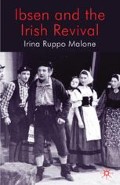Abstract
Ibsen’s works were rarely discussed in Ireland until the mid-1890s. The playwright who had wrought a revolution in the European theatrical world and who had shaken the foundations of social institutions was known in Ireland mainly as a London fashion craze and the author of the only unspectacular play staged by Beerbohm Tree on his Irish tour in 1894. Some five years later, the story was different. By then, Ibsen had become a significant influence on Irish writing and a catchword in theatre criticism. From 1899, playwrights and the public in Ireland were simultaneously subjected to two opposing facets of Ibsen’s drama. He was proclaimed as a great romanticist and the progenitor of dramatic realism, revered as a model patriot and feared as a cosmopolitan artist. Ibsen’s ambivalent role in the Irish Revival reflects the unique nature of the movement that was at once a belated reverberation of national romanticism — a phenomenon that had occupied European imagination since the late eighteenth century — and the beginning of Irish modernism.
Access this chapter
Tax calculation will be finalised at checkout
Purchases are for personal use only
Preview
Unable to display preview. Download preview PDF.
Copyright information
© 2010 Irina Ruppo Malone
About this chapter
Cite this chapter
Malone, I.R. (2010). Conclusion. In: Ibsen and the Irish Revival. Palgrave Macmillan, London. https://doi.org/10.1057/9780230276116_9
Download citation
DOI: https://doi.org/10.1057/9780230276116_9
Publisher Name: Palgrave Macmillan, London
Print ISBN: 978-1-349-31237-5
Online ISBN: 978-0-230-27611-6
eBook Packages: Palgrave Theatre & Performance CollectionLiterature, Cultural and Media Studies (R0)

